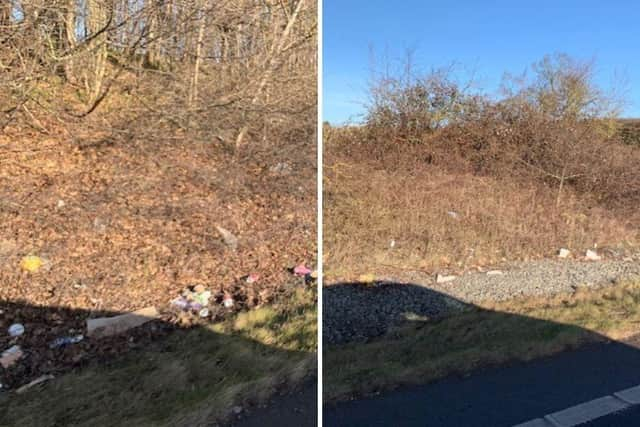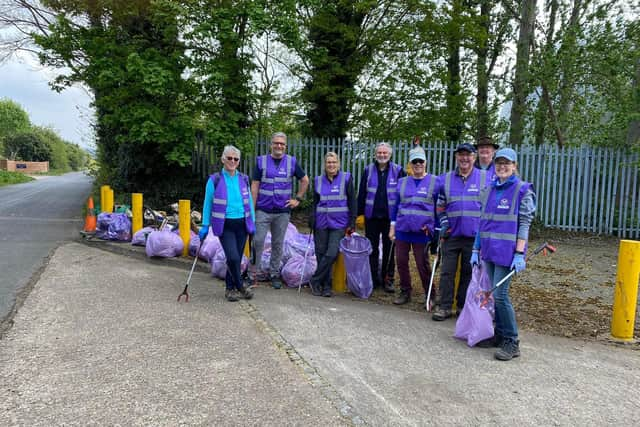Volunteer group calls for action over ‘deeply embarrassing’ littering on county’s main A roads
and live on Freeview channel 276
A litter picking group has shared its dismay over the “disgraceful” level of littering on Northamptonshire’s main A roads.
The Northants Litter Wombles have called for both North and West Northamptonshire Council to clear the main routes of litter – namely the A45, A14, A43, A5, A6, A428, A508, A509 and A4500.
Advertisement
Hide AdAdvertisement
Hide AdThe group, whose 3,000 members are “a force to be reckoned with”, is unable to clear the roads themselves due to health and safety issues, and want to see the councils take responsibility for it.


Sally Romain, who has been chair of the group for the past two years, said: “This shocking state of affairs has been ongoing since I have been chair.
“The sheer volume of litter at the side of the roads and in the middle sections that divide carriageways, as well as plastic in trees, makes the county look like a third world country.
“We all feel a deep sense of embarrassment about how bad it has been allowed to become.”
Advertisement
Hide AdAdvertisement
Hide AdAs chair, Sally has monthly meetings with WNC and littering on the main A roads has been on the agenda for the past two years.


“The issue is always raised and nothing seems to be done,” she said. “We can’t even get the basics right and it’s a huge embarrassment.”
One road which is continually complained about for having the most issues is the A45, which Sally has learned West Northamptonshire Council is contracted to clear the litter from four times a year.
However, Sally was told National Highways will only allow the council to close the A45 once a year due to the knock-on effect this has on traffic management – meaning the litter only gets cleared a quarter of the amount of times it should each year.
Advertisement
Hide AdAdvertisement
Hide AdWhen approached for comment by Chronicle & Echo, West Northamptonshire Council confirmed the last time the A45 was closed to clear litter was June 2022.
The spokesperson said: “We are working closely with our partners and contractors to review this work and find a suitable solution, which does not cause disruption to drivers and keeps everyone safe while clearing these fast roads.”
This newspaper asked WNC: if the A45 cannot be shut more than once a year, what is the alternative solution and when will it be implemented?
In response to this, the spokesperson added: “We are in regular dialogue with the relevant parties to find simple solutions.
Advertisement
Hide AdAdvertisement
Hide Ad“While these conversations are ongoing, we will continue to clear litter from those areas that can be safely accessed without the need of traffic management.
“The council is committed to clearing litter to make the area clean and green. Unfortunately, it is not always straightforward to clear litter from these fast roads and picking up litter puts our crews and the voluntary groups we support at risk.”
WNC also took the opportunity to “remind people it is irresponsible and illegal to litter and people can be issued with a fixed penalty notice” for the offence.
National Highways, the government-owned company charged with operating, maintaining and improving motorways and major A roads in England, was also approached for comment by this newspaper.
Advertisement
Hide AdAdvertisement
Hide AdThey were asked why the A45 can only be closed once a year, and if they and WNC are any closer to working out a solution to this issue.
Simon Phillips, National Highways’ service manager, said: “Although we close the A45 once a year to carry out cyclic maintenance, such as grass cutting, drainage clearance and litter picking, we also close it for other maintenance and road schemes throughout the year.
“These planned closures are shared with the relevant local authorities to give them the opportunity to take advantage of our traffic management and work alongside us to litter pick safely.”
National Highways last informed WNC of some planned road closures on the A45 on February 3 this year.
Advertisement
Hide AdAdvertisement
Hide AdSimon ended by addressing the fact littering is a “social problem across the country” and that National Highways “work closely with partners to keep roads safe and well maintained for both drivers and neighbouring communities”.
He said: “Roadside litter is not just unsightly but it’s a threat to wildlife and the environment and can also be a safety hazard for drivers. Picking it up puts road workers at risk.
“If people don’t drop litter in the first place, it wouldn’t need to be picked up – so we urge road users to take their litter home instead of throwing it out of their windows.”
Sally admitted she never knew waste could be such a complex area, with constant questioning needed about who is responsible for ensuring the roads are clear of litter.
Advertisement
Hide AdAdvertisement
Hide Ad“Who would want to work and spend their leisure time in Northamptonshire when it looks like a tip as you drive in on the A roads,” questioned Sally.
The chair feels she is “getting nowhere fast” and the main reason she took the position was to do something about her extreme concern for wildlife.
Sally says “when plastic is littered, microplastics go into the ground, animals are affected and eventually we will be too” – and nothing has changed in this county to make it any better over the past two years.
Northants Litter Wombles, first established in January 2021 during the pandemic, plans to continue putting pressure on the local authorities to find a solution.
